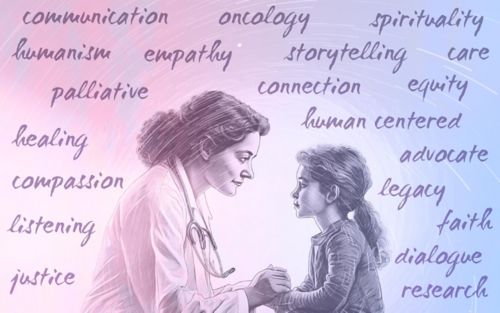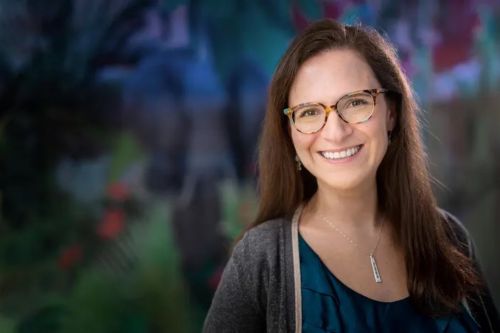St. Jude Family of Websites
Explore our cutting edge research, world-class patient care, career opportunities and more.
St. Jude Children's Research Hospital Home

- Fundraising
St. Jude Family of Websites
Explore our cutting edge research, world-class patient care, career opportunities and more.
St. Jude Children's Research Hospital Home

- Fundraising
Narrative Medicine: Exploring the power of storytelling

An artist’s rendition of connecting through compassionate care; a doctor's gaze meets a child's hopeful eyes.
Despite sometimes being dismissed or considered a “soft” skill, narrative storytelling is not a peripheral aspect of scientific inquiry — it’s the heartbeat of rigorous scientific communication.
Since entering the field of medicine 20 years ago, I have come to understand the profound impact narrative storytelling has on engaging audiences, fostering empathy and driving positive change in the realms of science and medicine. No matter how compelling our data may be, they only truly resonate and affect meaningful change when we endeavor to tell authentic, effective stories.
When confronted with obstacles or uncertainties in my own research or clinical practice, I often remind myself to pause and reflect on the crux of the narrative. It’s easy to become engrossed in data and methodologies, but without a compelling story at its core, our scientific and clinical enterprises may not reach their full potential for impact. In challenging moments, I encourage myself and others to stop and wonder: What story do I want to convey? Who are the storytellers and who are the listeners? This reflection serves as a reset, realigning my focus and reigniting my passion for the work.
Crafting a story that touches an audience and sparks genuine interest is essential for creating meaning in our work. Pragmatically, it’s also critical for securing funding, publishing papers in high-impact journals and effectively communicating research findings to the lay public. Our goal is not simply to present facts; we need to connect with people on a human level. Doing so necessitates creating an authentic and trustworthy voice for the storyteller, identifying the core message and choosing language and syntax that resonates with and inspires the intended audience to partner in our collaborative efforts to improve health care outcomes. In my work in pediatric palliative care at St. Jude, both at the patient’s bedside and in the research lab, I’ve learned to respect narrative storytelling as an essential skill.
Connecting through communication and (secular) spirituality
I was drawn to medicine by an intrinsic desire to connect meaningfully, person to person, and offer support during some of the most difficult experiences in other people’s lives.
The field of pediatric palliative care was just beginning to coalesce when I entered medical school in the early 2000s. Prior to medical school, I had not considered palliative care as a career path; I just knew I wanted to connect with people and offer healing. I had studied English language and poetry in college and was passionate about the science and art of communication. From an early age, I sensed that words, both spoken and written, carried a profound and often underappreciated power to evoke emotion, forge community and affect change. During my medical training, I was lucky to find role models and mentors who helped me recognize that a career in palliative care could enable me to merge my interest in language and communication with my calling for humanism in medicine.
As I reflect on the past two decades, a singular piece of advice I often share with learners and trainees is to prioritize surrounding oneself with people who embody and espouse values that nurture and inspire you. Across my career, I have both inadvertently and intentionally sought out individuals whose values resonated with mine. In doing so, I was able to discover and explore new opportunities that I may not have pursued otherwise. I recognize that this advice may be controversial, but I wholeheartedly encourage trainees to focus on choosing people, not projects, as guideposts to help illuminate their future career paths.
As I navigated years of specialized training in pediatric oncology and palliative medicine, I also began to wrestle with my own sense of spirituality amidst the devastating realities of incurable childhood cancer. My experiences, both personally and professionally, challenged traditional notions of faith, particularly in the face of profound suffering and loss. I discovered that, even in moments of despair, I found faith and comfort in my ability to bear witness, offer support, and create space for vulnerability, authenticity, and connection through skillful communication. Having a window into the hardest experience of a person’s life is a privilege, and being invited into this space is sacred.

Erica C. Kaye, MD, MPH is a passionate advocate for narrative medicine, weaving storytelling into her work in pediatric palliative care and oncology to foster empathy and drive positive change in healthcare.
When I wrote about my struggle with spirituality as a clinician and scientist, I was surprised and moved to see how this story resonated with tens of thousands of people both in health care and in the broader community. I received hundreds of personal letters from strangers describing how this narrative impacted their lives in unique and specific ways. The public response to this essay offered me a powerful lesson about the reach and influence of narrative writing. Over the next several years, I published additional narrative pieces in high-impact platforms; again, I was surprised and inspired by how stories can travel across vast geographic, cultural, religious, socioeconomic and multidisciplinary divides to reach people and create community. Our authentic stories have the power to foster empathy, grow knowledge and understanding and drive positive change. By sharing personal reflections and insights, we can transcend “status quo” boundaries within academia and generate dialogue that matters.
Storytelling in palliative care practice
My research program centers on the science of compassionate communication, and I am privileged to have an opportunity to be immersed in my field of study each time I sit at the bedside of a patient and family. In pediatric palliative oncology, much of our work — helping patients and families understand prognosis, identify their goals, make treatment decisions that honor their hopes and wishes and optimize quality of life for the whole family — hinges on our ability to foster communication, connection and collaboration.
I am deeply invested in exploring strategies that underscore the power of storytelling in academic medicine, much like how we approach narrative-based practice in palliative care. In caring for children with serious illness and their families, we prioritize a human-centered approach, focusing on holistic care that emphasizes the “whole personhood” of a patient or family. Our practice revolves around deep, active listening and a profound respect for the dignity of individuals, centering their hopes, worries, passions and goals rather than defining them by their illness.
I advocate for the purposeful application of a similar approach across all areas of medicine and science, where active listening with the goal of recognizing holistic personhood becomes an integral part of the toolkit for every clinician and researcher. Achieving this goal requires us to champion an academic culture that prioritizes exposure to and training in narrative medicine at the early stages of our medical education and across our career development.
Embracing narrative in medicine
To enact this cultural shift, we must be strategic and implement a multifaceted approach. I am grateful for leaders in the Journal of Clinical Oncology, who provided their journal as a platform for a call to action to increase awareness of storytelling’s importance in oncology.
I believe there are ample opportunities to shift the culture in medicine and science across institutions gradually. This transformation involves various strategies at institutional and national levels, including didactic programming aimed at providing formal education to health care professionals about narrative medicine and developing specific infrastructure to facilitate narrative-based initiatives, forums, and collaborative professional communities.
At St. Jude, we are fortunate to have multidisciplinary colleagues across clinical and research domains who are skillful storytellers. Trisha Paul, MD, one of our combined pediatric hematology-oncology and hospice and palliative medicine fellows, is an expert in narrative medicine, and she is leading efforts to develop a research program anchored in the investigation of narrative-based approaches in health care. For example, Paul’s study, titled “Chronicling Cancer,” engages adolescents and young adults with cancer in a structured narrative medicine activity, and her early findings show that structured opportunities for writing about the illness experience offer measurable benefits for pediatric cancer patients.
As a palliative oncologist, I’ve learned that healing comes in many shapes and sizes, sometimes transcending our medical interventions. Giving people a “voice,” a platform to tell their story and feel heard and a way to create meaning and legacy through narrative expression is paramount. We hope to study the impact of narrative interventions on the experiences of patients, families and health care professionals, identifying strategies to integrate evidence-based narrative oncology practices into the standard of care for pediatric cancer shareholders at our institution and across the country.
Harnessing the power of narrative
The more time we invest in listening to others’ lived experiences, the more we evolve as people, forge meaningful connections and enhance our ability to advocate for equity and justice in our clinical practice and research. Our efforts to listen to, reflect on and share stories can influence culture and both directly and indirectly guide systemic changes that strengthen empathy, connection and equity in health care.
As I reflect on the journey that led me to appreciate the power of narrative in medicine and science, I'm filled with optimism for the future. By embracing storytelling as a tool for positive change, we can transform the landscape of health care and research. Let us continue to harness the power of narrative to inspire, educate and heal — together, we can write a new chapter for the future of medicine and science.






